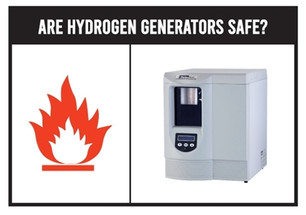Posted by Chrom Tech on 2nd Feb 2026
Are Hydrogen Generators Safe?
Laboratories traditionally rely on compressed hydrogen cylinders for their gas supply, but this approach carries safety concerns and can cause unexpected downtime when deliveries are delayed. Switching to an on-site hydrogen gas generator offers a safer, more reliable, and cost-efficient alternative for continuous gas delivery.
Is Producing Hydrogen Gas On-Site Safe?
Yes. Hydrogen generators are designed with safety in mind—they produce gas on-demand and only in the exact amount needed by your GC or instrument. These systems store less than 300 mL of hydrogen at low pressure, compared to the large volumes stored in high-pressure cylinders. If pressure exceeds limits, a leak is detected, or gas demand surpasses capacity, the generator automatically shuts down and triggers an audible alarm for immediate awareness.
Is It Difficult to Install a Hydrogen Gas Generator?
No. Installation is straightforward and eliminates the risks associated with handling high-pressure cylinders. Simply fill the system with deionized water (1 megohm purity or better), connect it to an electrical outlet, and plumb it to your instrument using pre-cleaned 1/8-inch refrigerant-grade copper or stainless-steel tubing. Once connected, your generator continuously supplies clean, consistent hydrogen gas on-demand.
Do I Need a Hydrogen Sensor Near the Generator?
Typically, no. Hydrogen released from a gas chromatograph (GC) rapidly diffuses into the surrounding air. In a standard laboratory environment, it is nearly impossible for the concentration to reach hydrogen’s lower explosive limit (LEL) of 4%. Hydrogen generators are engineered for safe operation without requiring additional sensors.
Is It Easy to Maintain a Hydrogen Gas Generator?
Absolutely. Hydrogen generators are low-maintenance and require no tank changes. The main task is refilling the water reservoir weekly or biweekly and completing simple preventive maintenance using manufacturer-recommended service kits. For added convenience, maintenance can be performed by a trained technician. Chrom Tech also provides GC accessories and replacement components to help keep your system performing at peak efficiency.
How Do I Size the Generator for My Instrument?
Hydrogen serves as a fuel, carrier, and reaction gas in many GC applications. The correct generator size depends on your instrument’s total gas consumption and required purity level. Contact Chrom Tech’s technical team for personalized sizing assistance and recommendations for Zero Air, Nitrogen, or Multi-Gas generators to meet your laboratory’s needs.
Gas Cylinders vs. On-Site Generators
| Feature | Gas Cylinders | On-Site Hydrogen Generator |
|---|---|---|
| Storage Pressure | High (up to 2,000 psi) | Low (< 150 psi, on-demand) |
| Safety Risk | Potential for leaks or explosions | Built-in leak detection and auto shutoff |
| Gas Availability | Dependent on delivery schedule | Continuous on-demand production |
| Maintenance | Tank replacement and handling | Refill water and minimal upkeep |
| Operating Cost | Ongoing cylinder rental and delivery | Low cost—uses only water and power |
| Purity Control | Variable between cylinder batches | Consistent high purity every time |
Summary
Hydrogen gas generators provide a safe, reliable, and cost-effective alternative to traditional gas cylinders. With on-demand generation, built-in safety systems, and minimal maintenance requirements, these systems reduce risk and maximize instrument uptime. Parker hydrogen, nitrogen, and zero air generators deliver exceptional quality and precision for chromatography laboratories worldwide. Contact us at sales@chromtech.com to assess your gas generation needs and enhance your lab’s safety and productivity.
Frequently Asked Questions About Hydrogen Gas Generators
Are hydrogen generators safe to use in laboratories?
Yes. Hydrogen generators store only a few hundred milliliters of gas at low pressure, significantly reducing explosion risk compared to cylinders. Built-in leak detection and automatic shut-off systems ensure safe operation.
What maintenance do hydrogen generators require?
Regular maintenance involves refilling the water reservoir weekly or biweekly and following preventive maintenance guidelines. Chrom Tech offers convenient maintenance kits and service options for long-term performance.
Do hydrogen generators require additional safety sensors?
In most labs, separate hydrogen sensors are not required. Hydrogen released into ambient air disperses quickly and remains well below the 4% lower explosive limit.
What are the main benefits of switching from gas cylinders?
On-site generation eliminates cylinder handling, improves safety, ensures consistent purity, and drastically reduces operational costs. It also removes downtime caused by supply delays or tank replacements.


